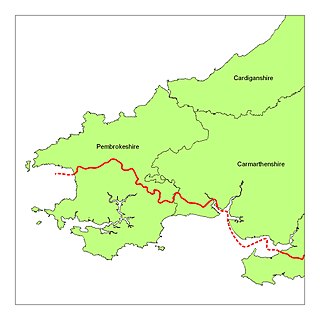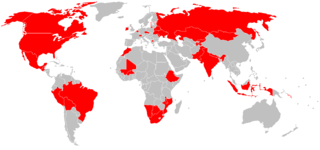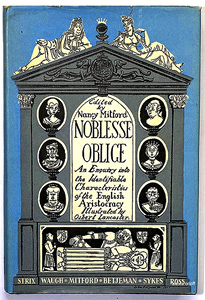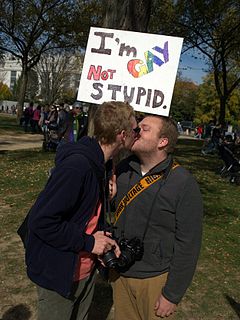 W
WA bilingual pun is a pun created by a word or phrase in one language sounding similar to a different word or phrase in another language. The result of a bilingual pun is often a joke that makes sense in more than one language. A bilingual pun can be made with a word from another language that has the same meaning, or an opposite meaning.
 W
WCafé society was the description of the "Beautiful People" and "Bright Young Things" who gathered in fashionable cafés and restaurants in New York, Paris and London beginning in the late 19th century. Maury Henry Biddle Paul is credited with coining the phrase "café society" in 1915.
 W
WCenter versus periphery is a linguistic theory put forward by Japanese folklorist Yanagita Kunio explaining the usage of certain words in a language used in some regions while not in others. The theory may also explain the existence of other cultural features, or lack thereof, in differing regions; though it was specifically created to address linguistic differences.
 W
WCode-switching is a type of linguistic behaviour that juxtaposes "passages of speech belonging to two different grammatical systems or sub-systems, within the same exchange". Code-switching in Hong Kong mainly concerns two grammatical systems: Cantonese and English. According to Matrix Language Frame Model, Cantonese, as the "matrix language", contributes bound morphemes, content and function words, whereas, English, the "embedded language", contributes lexical, phrases or compound words.
 W
WContrastive focus reduplication, also called contrastive reduplication, identical constituent compounding, lexical cloning, or the double construction, is a type of syntactic reduplication found in some languages. Doubling a word or phrase – such as "do you like-like him?" – can indicate that the prototypical meaning of the repeated word or phrase is intended."As a rough approximation, we can say that the reduplicated modifier singles out a member or subset of the extension of the noun that represents a true, real, default, or prototype instance."
 W
WThe Declaration on the Common Language was issued in 2017 by a group of intellectuals and NGOs from Croatia, Bosnia and Herzegovina, Montenegro, and Serbia who were working under the banner of a project called "Language and Nationalism". The Declaration states that Croats, Bosniaks, Serbs and Montenegrins have a common standard language of the polycentric type.
 W
WDegree of endangerment is an evaluation assigned by UNESCO to the languages in the Atlas of the World's Languages in Danger. Evaluation is given according to nine criteria, the most important of which is the criterion of language transmission between generations.
 W
WIn linguistics, diglossia is a situation in which two dialects or languages are used by a single language community. In addition to the community's everyday or vernacular language variety, a second, highly codified lect is used in certain situations such as literature, formal education, or other specific settings, but not used normally for ordinary conversation. In most cases, the H variety has no native speakers but various degrees of fluency of the low speakers.
 W
WDiscourse is a generalization of the notion of a conversation to any form of communication. Discourse is a major topic in social theory, with work spanning fields such as sociology, anthropology, continental philosophy, and discourse analysis. Following pioneering work by Michel Foucault, these fields view discourse as a system of thought, knowledge, or communication that constructs our experience of the world. Since control of discourse amounts to control of how the world is perceived, social theory often studies discourse as a window into power. Within theoretical linguistics, discourse is understood more narrowly as linguistic information exchange and was one of the major motivations for the framework of dynamic semantics, in which expressions' denotations are equated with their ability to update a discourse context.
 W
WDiscourse analysis (DA), or discourse studies, is an approach to the analysis of written, vocal, or sign language use, or any significant semiotic event.
 W
WA double entendre is a figure of speech or a particular way of wording that is devised to have a double meaning, of which one is typically obvious, whereas the other often conveys a message that would be too socially awkward, sexually suggestive, or offensive to state directly.
 W
WA first language, native tongue, native language, or mother/father/parent tongue, is a language or dialect that a person has been exposed to from birth or within the critical period. In some countries, the term native language or mother tongue refers to the language of one's ethnic group rather than one's first language.
 W
WInternet linguistics is a domain of linguistics advocated by the English linguist David Crystal. It studies new language styles and forms that have arisen under the influence of the Internet and of other new media, such as Short Message Service (SMS) text messaging. Since the beginning of human-computer interaction (HCI) leading to computer-mediated communication (CMC) and Internet-mediated communication (IMC), experts, such as Gretchen McCulloch have acknowledged that linguistics has a contributing role in it, in terms of web interface and usability. Studying the emerging language on the Internet can help improve conceptual organization, translation and web usability. Such study aims to benefit both linguists and web users combined.
 W
WThe official status of the Irish language remains high in the Republic of Ireland. This reflects the dominance of the language in Irish cultural and social history until the nineteenth century and its role in Irish cultural identity. In April 2016 1,761,420 people in the Republic claimed that they could speak Irish, representing 39.8 per cent of respondents out of a population of 4,921,500. In Northern Ireland 104,943 claimed to be able to speak Irish out of a population of 1,882,000. It has been found, however, that while ideological support for Irish is high, actual routine use is very low, and that there is no correlation between personal fluency in the language and the perceived value of Irish as an identity-marker. Nevertheless, the language benefits from the support of activists who continue to use it as a social and cultural medium.
 W
WIn linguistics, a koiné language, koiné dialect, or simply koiné is a standard or common language or dialect that has arisen as a result of the contact, mixing, and often simplification of two or more mutually intelligible varieties of the same language.
 W
WThe Landsker Line is a term used for the language border in Wales between the largely Welsh-speaking and largely English-speaking areas in Pembrokeshire and Carmarthenshire. The English-speaking areas, south of the Landsker line and known as Little England beyond Wales, are notable for having been English linguistically and culturally for many centuries despite being far from the England–Wales border.
 W
WA language border or language boundary is the line separating two language areas. The term is generally meant to imply a lack of mutual intelligibility between the two languages. If two adjacent languages or dialects are mutually intelligible, no firm border will develop, because the two languages can continually exchange linguistic inventions; this is known as a dialect continuum. A "language island" is a language area that is completely surrounded by a language border.
 W
WIn linguistics, language death occurs when a language loses its last native speaker. By extension, language extinction is when the language is no longer known, including by second-language speakers. Other similar terms include linguicide, the death of a language from natural or political causes, and rarely glottophagy, the absorption or replacement of a minor language by a major language.
 W
WDuring the dictatorship of Francisco Franco from 1939 to 1975, policies were implemented in an attempt to increase the dominance of the Spanish language, also known as Castilian, over the other languages of Spain. Franco's regime had Spanish nationalism as one of its bases. Under his dictatorship, the Spanish language was declared Spain's only official language.
 W
WMany countries and national censuses currently enumerate or have previously enumerated their populations by languages, native language, home language, level of knowing language or a combination of these characteristics.
 W
WLinguistic landscape is the "visibility and salience of languages on public and commercial signs in a given territory or region". Linguistic landscape has been described as being "somewhere at the junction of sociolinguistics, sociology, social psychology, geography, and media studies". It is a concept which originated in sociolinguistics and language policy as scholars studied how languages are visually displayed and hierarchised in multilingual societies, from large metropolitan centers to Amazonia. For example, linguistic landscape scholars have described how and why some public signs in Jerusalem are presented in Hebrew, English, and Arabic, or a combination thereof.
 W
WLTI – Lingua Tertii Imperii: Notizbuch eines Philologen (1947) is a book by Victor Klemperer, Professor of Literature at the Dresden University of Technology. The title, half in Latin and half in German, translates to "The Language of the Third Reich: A Philologist's Notebook"; the book is published in English translation as The Language of the Third Reich.
 W
WMansplaining is a pejorative term meaning "(of a man) to comment on or explain something to a woman in a condescending, overconfident, and often inaccurate or oversimplified manner". Author Rebecca Solnit ascribed the phenomenon to a combination of "overconfidence and cluelessness". Lily Rothman, of The Atlantic, defined it as "explaining without regard to the fact that the explainee knows more than the explainer, often done by a man to a woman".
 W
W"Manspreading" or "man-sitting" is a pejorative neologism referring to the practice of men sitting in public transport with legs wide apart, thereby covering more than one seat.
 W
WNoblesse Oblige: An Enquiry Into the Identifiable Characteristics of the English Aristocracy (1956) is a book that purports to be edited by Nancy Mitford, illustrated by Osbert Lancaster, caricaturist of English manners, and published by Hamish Hamilton. The anthology comprises four brief essays by Nancy Mitford, Alan S. C. Ross, “Strix” and Christopher Sykes, a letter by Evelyn Waugh, and a poem by John Betjeman.
 W
WPoliteness is the practical application of good manners or etiquette so as not to offend others. It is a culturally defined phenomenon, and therefore what is considered polite in one culture can sometimes be quite rude or simply eccentric in another cultural context.
 W
WPromotion of Putonghua is a movement led by the government of China since the Communist Party came to the power. Currently, the Promotion of Putonghua is led by State Language Work Committee, a governing body which regulates language use on behalf of the People's Republic of China.
 W
WLinguistic reappropriation, reclamation, or resignification is the cultural process by which a group reclaims words or artifacts that were previously used in a way disparaging of that group. It is a specific form of a semantic change. Linguistic reclamation can have wider implications in the fields of discourse and has been described in terms of personal or sociopolitical empowerment.
 W
WA speech community is a group of people who share a set of linguistic norms and expectations regarding the use of language. It is a concept mostly associated with sociolinguistics and anthropological linguistics.
 W
WTerms used to describe homosexuality have gone through many changes since the emergence of the first terms in the mid-19th century. In English, some terms in widespread use have been sodomite, Sapphic, Uranian, homophile, lesbian, gay, effeminate, queer, homoaffective, and same-sex attracted. Some of these words are specific to women, some to men, and some can be used of either. Gay people may also be identified under the umbrella terms LGBT.
 W
WTouron is a derogatory term combining the words "Tourist" with "Moron" to describe any person who, while on vacation, commits an act of pure stupidity. The term is considered park ranger slang that describes how some tourists act when entering a national park. The phrase indicates an act of ignorance and is known to be used in different subcultures. It is also used to describe tourists in general when they are outside their normal "comfort zone".
 W
WA truce term is a word or short phrase accepted within a community of children as an effective way of calling for a temporary respite or truce during a game or activity, such as tag or its variants. Common examples in English speaking cultures are barley, fainites, crosses, kings and exe(s) in the United Kingdom, pegs and nibs in New Zealand and variants of barley in Australia. In the United States, terms based on time-out have, from the 1950s onwards, largely supplanted earlier common terms based on kings and exe(s). Since the late 1980s time-out has been recorded in other English-speaking cultures besides the US. Examples of use of truce terms are if a child has a stitch or wants to raise a point on the rules of the game.
 W
WA unisex name is a given name that is not gender-specific. Unisex names are common in the English-speaking world, especially in the United States. By contrast, some countries have laws preventing unisex names, requiring parents to give their children sex-specific names. In other countries or cultures, social norms oppose such names and transgressions may result in discrimination, ridicule, and psychological abuse.
 W
WThe Urdu movement was a socio-political movement aimed at making Urdu the universal language and symbol of the cultural and political identity of the Muslim communities of the Indian subcontinent during the British Raj. The movement began with the fall of the Mughal Empire in the mid-19th century, fuelled by the Aligarh movement of Sir Syed Ahmed Khan. It strongly influenced the All India Muslim League and the Pakistan movement.
 W
WIn spoken language analysis, an utterance is the smallest unit of speech. It is a continuous piece of speech beginning and ending with a clear pause. In the case of oral languages, it is generally, but not always, bounded by silence. Utterances do not exist in written language, however- only their representations do. They can be represented and delineated in written language in many ways.
 W
WA vernacular or vernacular language refers to the language or dialect that is spoken by people that are inhabiting a particular country or region. The vernacular is typically the native language, normally spoken informally rather than written, and seen as of lower status than more codified forms. It may vary from more prestigious speech varieties in different ways, in that the vernacular can be a distinct stylistic register, a regional dialect, a sociolect, or an independent language. Vernacular is a term for a type of speech variety, generally used to refer to a local language or dialect, as distinct from what is seen as a standard language. The vernacular is contrasted with higher-prestige forms of language, such as national, literary, liturgical or scientific idiom, or a lingua franca, used to facilitate communication across a large area.
 W
WIn historical linguistics, the wave model or wave theory is a model of language change in which a new language feature (innovation) or a new combination of language features spreads from its region of origin, affecting a gradually expanding cluster of dialects. The theory was intended as a substitute for the tree model, which did not seem to be able to explain the existence of some features, especially in the Germanic languages, by descent from a proto-language. At its most ambitious, it is a wholesale replacement for the tree model of languages. During the 20th century, the wave model had little acceptance as a model for language change overall, except for certain cases, such as the study of dialect continua and areal phenomena; it has recently gained more popularity among historical linguists, due to the shortcomings of the tree model.